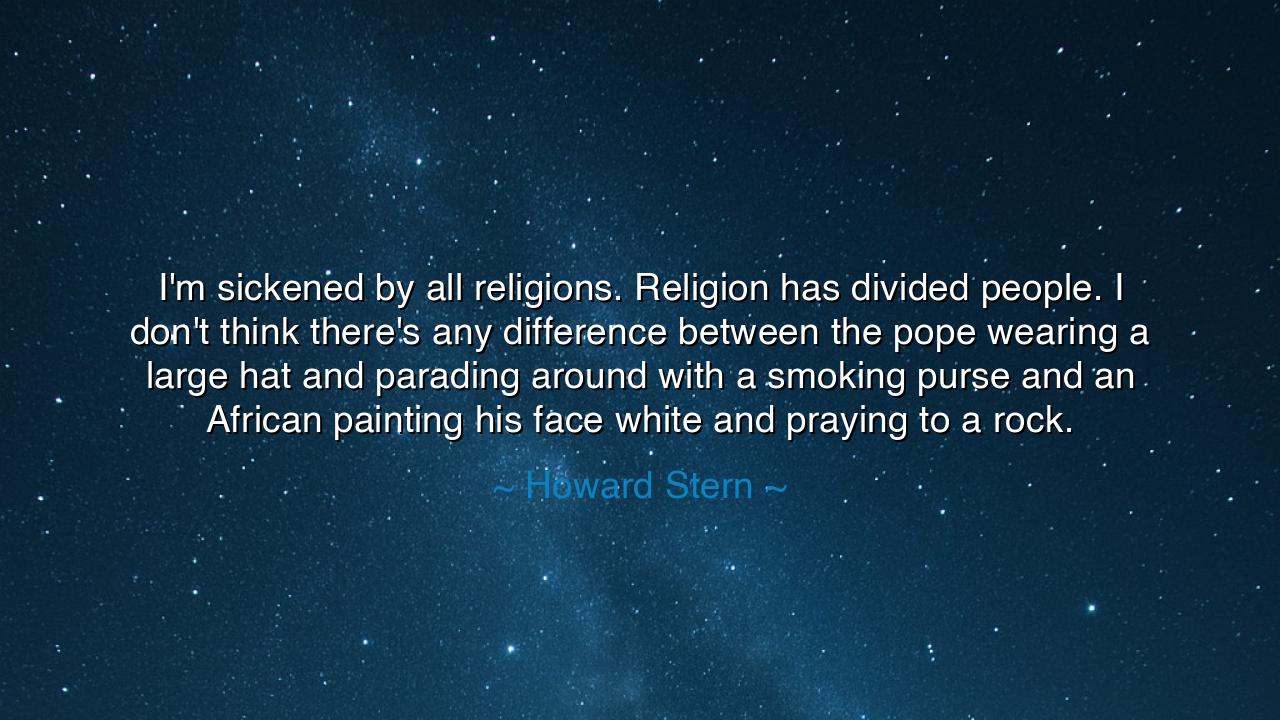
I'm sickened by all religions. Religion has divided people. I
I'm sickened by all religions. Religion has divided people. I don't think there's any difference between the pope wearing a large hat and parading around with a smoking purse and an African painting his face white and praying to a rock.






“I’m sickened by all religions. Religion has divided people. I don’t think there’s any difference between the pope wearing a large hat and parading around with a smoking purse and an African painting his face white and praying to a rock.” – Howard Stern
In these raw and searing words, Howard Stern, the provocateur and modern philosopher of irreverence, gives voice to a cry as old as civilization itself: the cry against division in the name of the divine. His language is unadorned and fierce, but beneath its sharpness lies a lament—the lament of one who sees that what was meant to unite humanity under love and reverence has too often torn it apart. When Stern says he is “sickened by all religions,” he is not merely rejecting faith; he is condemning the corruption of faith—the transformation of spiritual truth into the machinery of pride, hierarchy, and hatred. His disgust is not directed at belief itself, but at what men have made of belief.
The origin of this sentiment reaches back to every age when the sacred has been used to divide. From the burning of heretics in the Middle Ages to the sectarian wars that ravaged nations, the blood spilled in the name of holiness has left a stain upon human history. Religion, born from humanity’s yearning for connection with the divine, has too often become a banner of separation. Stern’s comparison between “the pope wearing a large hat” and “an African painting his face white and praying to a rock” is not mockery—it is revelation. He unmasks the vanity of those who claim their rituals are superior while dismissing others as primitive. Both, he says, are the same: attempts to reach what cannot be fully understood, dressed in symbols that, though different in form, are equal in intent.
This is not a new cry. The prophets of every age have made it. Lao Tzu warned that when the Tao is lost, religion arises to replace it with empty rules. Jesus himself rebuked the priests of his time for honoring God with their lips while their hearts were far from truth. The Buddha walked away from the rituals of the Brahmins to teach compassion instead of ceremony. What Stern voices in his blunt modern tone is the same truth the sages once whispered with reverence: that true spirituality transcends religion—that the essence of divinity cannot be confined to robes, titles, or sacred objects.
History offers us countless examples of how faith turned to folly when its form replaced its essence. Consider the wars between Catholics and Protestants, brothers who claimed to follow the same Christ yet slaughtered one another over the manner of worship. Or the conflicts between Hindus and Muslims that scarred the lands of India, where prayers once rose side by side. In each case, religion divided where love could have united. The very language of the divine—meant to lift the human soul beyond the ego—was seized by the ego and turned into weapon and wall. It is this tragedy that sickens Stern’s spirit: not belief, but blindness.
Yet within his harsh words lies a yearning for truth. When he rejects all religions, what he truly rejects is pretense. He longs for a faith that needs no costumes, no symbols, no division—a faith that speaks from heart to heart without the burden of hierarchy. In comparing the grandeur of the Vatican to the simplicity of an African ritual, Stern levels the human field, reminding us that before the Infinite, no man stands higher than another. The divine is not impressed by gold or incense; it listens to sincerity.
And so his words, though barbed, carry the echo of ancient wisdom: that the search for God must be stripped of pride. Religion, if it is to be holy again, must return to humility—to the quiet inner knowing that the divine is not owned by any creed or nation. The true sacred path lies not in ceremony, but in compassion; not in doctrine, but in direct experience; not in preaching, but in peace.
Therefore, my child of faith and doubt, let this teaching awaken you. Do not despise the symbols of religion, but do not worship them either. Honor every path that leads toward kindness and reject every one that breeds hatred. Pray, if you pray, not because you are told to, but because your soul hungers to speak with something greater. Respect the beliefs of others, but cling to none as absolute. For the divine wears a thousand masks, and the wise man kneels before them all, knowing that they are but reflections of a single light.
In the end, Howard Stern’s words remind us of this eternal truth: that the heart of spirituality is not found in temples or rituals, but in the living pulse of love that beats within all beings. When you see that, you will no longer be divided by religion—you will be united by reverence. For the divine is not in the smoke, nor in the stone, nor in the crown, but in the simple, unguarded awareness that we are all, in truth, one.






AAdministratorAdministrator
Welcome, honored guests. Please leave a comment, we will respond soon